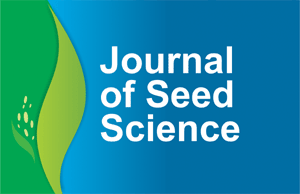Abstract:
The accelerated aging test is widely used to evaluate seed vigor. However, for the wheat crop, discrepancies are found in the literature regarding temperature and period of exposure to stress. This study aimed to evaluate the efficiency of the accelerated aging test in different combinations of time and temperature in seed vigor evaluation in wheat lots and cultivars. The following cultivars were used: Tbio Sintania, Tbio Sossego, Tbio Sinuelo, LG Oro, Tbio Toruk, and CD 150 (Group 1), represented by one lot each, and five lots of the cultivar CD 150 (Group 2). Water content, germination, first count of germination, and seedling emergence in the field were evaluated for characterization of initial physiological potential. Then the accelerated aging test was applied to the lots under the following aging conditions: 41 °C / 48 and 72 h, 43 °C / 40 and 48 h, and 45 °C / 24 and 40 h in plastic boxes, with 40 mL of distilled water and seeds distributed in a single layer on a screen. After aging, the water content and germination of the seeds were determined. Analysis of variance was performed on the data, and the means were compared by Tukey’s test, at 5% probability. The simple correlation test (r) was performed between the analyzed variables and the seedling emergence in the field test. The accelerated aging test with the combinations of 41 °C / 72 h and 43 °C / 48 h is efficient for evaluating seed vigor of wheat lots and cultivars. The combination of 43 °C / 48 h provides results more quickly, saving 24 h in relation to the methodology recommended in the literature (41 °C / 72 h).
Index terms:
abiotic stresses; deterioration; physiological potential; Triticum aestivum L

 Thumbnail
Thumbnail
